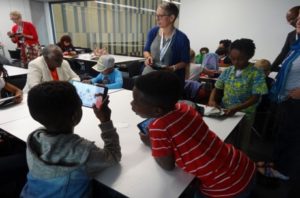 Apart from several thousand grassroots initiatives, Bahá’ís are engaged in over 550 ongoing projects that are larger in scope and more ambitious in their objectives. Some emerge from small efforts at the local level, while others are established from the beginning as structured projects. Sustainability is a natural feature of a project that emerges organically from a grassroots effort. Where a project is introduced into a community, particular care is taken to ensure that its scope does not exceed local capacity to sustain it. Projects, then, gradually grow in complexity over time and extend the range of their influence in keeping with experience and human resources.
Apart from several thousand grassroots initiatives, Bahá’ís are engaged in over 550 ongoing projects that are larger in scope and more ambitious in their objectives. Some emerge from small efforts at the local level, while others are established from the beginning as structured projects. Sustainability is a natural feature of a project that emerges organically from a grassroots effort. Where a project is introduced into a community, particular care is taken to ensure that its scope does not exceed local capacity to sustain it. Projects, then, gradually grow in complexity over time and extend the range of their influence in keeping with experience and human resources.
Bahá’í literacy projects promote not only the acquisition of reading and writing skills but also the spiritual empowerment of individuals and communities. In Guyana, for example, the “On the Wings of Words” project builds preliteracy and literacy skills in children and junior youth aged 4 to 16 years, while helping them to reflect on issues significant to their lives. The project has trained more than 7,200 facilitators and reached more than 13,000 young people in both urban and rural areas. The Uganda Program of Literacy for Transformation (UPLIFT), to take another example, is working with illiterate adults, mainly women. Its program stresses the necessity of promoting the equality of women and men and the importance of establishing proper relationships among family members. Materials discuss topics such as community decision making, virtues, and health, including the prevention of HIV/AIDS and malaria. Over 6,000 individuals have benefited from adult basic education offered by UPLIFT.



